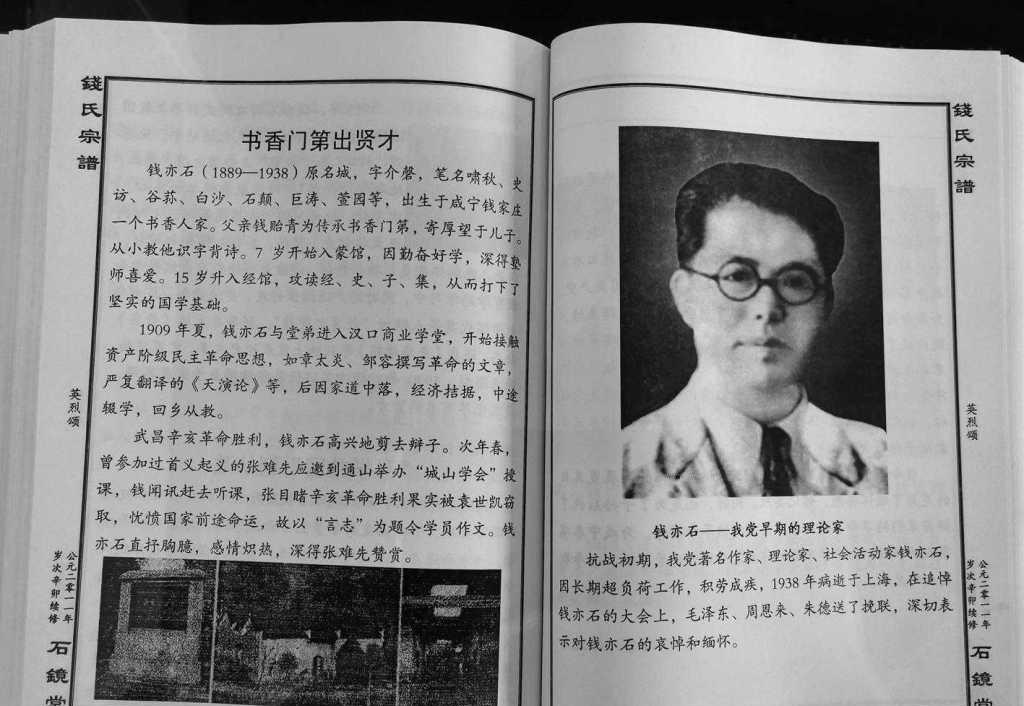Source: Hubei Learning Platform
Author: Hai Bing Zhu Jiayi Xia Zhizhi Xu Pei

In the Memorial Hall of Qian's Heroic Martyrs in Xianning, Hubei Province, the heroic deeds of Qian Yishi, Qian Ying and a number of other Qian's heroic martyrs are displayed. The 2011 edition of "Qian's Family Ride" records the legendary experiences of these heroes.
Qian Yishi (1889-1938), formerly known as Chengcheng (城), was a famous educator, theorist and social activist, who served as the director of the Hubei Provincial Library and the director of the Revolutionary Culture Library.
According to the "Qian Family Ride", Qian Yishi was born in a family of scholars in Qianjiazhuang, Xianning, Hubei Province. His father had high hopes for him and taught him to read and write from an early age. In 1916, Qian Yishi was admitted to the National Wuchang Higher Normal Preparatory Department. In 1920, he graduated with honors and was hired by the Hubei Provincial Department of Education as a clerk. In 1921, Dong Biwu was appointed as the director of the training of the First Division in Hubei Province, and Qian Yishi was also hired as an ethics teacher. Later, he mainly served as the director of the Wuchang High School Attached Primary School, and also served as a natural history teacher at Chung Hua University.
In April 1924, through the introduction of Dong Biwu and Chen Tanqiu, Qian Yishi joined the Communist Party of China and became a proletarian vanguard fighter. Soon after Qian Yishi joined the party, he joined the Kuomintang in his personal capacity in accordance with the party's decision and assisted Dong Biwu in preparing for the establishment of the Kuomintang's provisional party department in Hubei Province. In January 1928, qian Yishi secretly arrived in Tokyo, Japan, according to the party's decision, where he concentrated on studying Capital. In August, Qian Yishi and Dong Biwu transferred to Moscow, Soviet Union, and were assigned to a special class at the Communist Sun Yat-sen University of Chinese laborers.
After Qian Yishi returned to China, he began his career as a writer and translator. He has successively written "Philosophical Common Sense", "A Brief Explanation of Evolution", and translated Engels's famous book "German Peasants' War". He was hired as a professor at Shanghai Law and Politics College and Jinan University, where he taught courses such as History of Chinese Diplomacy, Principles of Modern Education, History of Modern World Politics, and Modern Economic History of China. The lecture notes and monographs he compiled are insightful and well-known in the cultural circles, and he is known as the "Red Professor".
After the Lugou Bridge Incident on July 7, 1937, Qian Yishi went all out to devote himself to the Anti-Japanese Salvation Movement. Zhou Enlai decided to form a large cultural and political work organization in Shanghai, the Field Service Corps, with Qian Yishi as the captain, and Guo Moruo introduced him to serve in the Eighth Group Army. He led all the team members in and out of the gunfire and bullet rain, carried out condolence propaganda, and stimulated the morale of the anti-Japanese resistance. In the meantime, due to long-term overload, he became ill with overwork and unfortunately died.
On February 27, 1938, all walks of life in Wuhan held a solemn memorial meeting for Qian Yishi in the auditorium of the Hankou Chamber of Commerce. 44 of his writings were on display, filled with ties, drapes and wreaths. The banners sent by Mao Zedong, Zhou Enlai, and others were written with the words "Philosophers wither away," expressing their deep condolences to Qian Yishi. Dong Biwu, Shen Junru, Guo Moruo, and others attended the memorial service. On March 1, the General Headquarters of the Eighth Army held a memorial meeting for Qian Yishi in Jinhua, Zhejiang Province, and the commanders and fighters sang elegies in front of his portrait: "You are the bright light of the night, you roar and call on the slaves to struggle; you use your own painstaking efforts to write the fight for national liberation and freedom!" ”
Under the influence of Qian Yishi, Qian was loyal and martyr, and many members of this "red family" contributed to the revolution. Qian Yishi's eldest son, Qian Yuanduo, joined the Communist Party in 1933 and transported "paper bombs" (propaganda materials) for China's air force on an expedition to Japan; the second son, Qian Yuanjing, died in the War of Resistance at the age of 22. Qian Ying, a female revolutionary who came out of the mountains of southern Hunan, was one of the prototypes of Han Ying, the protagonist of "Honghu Red Guards", and the first minister of supervision of New China, who embarked on the revolutionary road and was also influenced and supported by his uncle Qian Yishi.